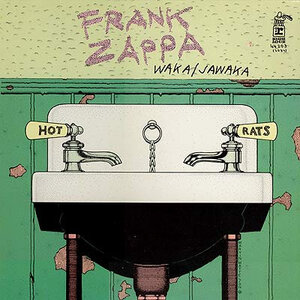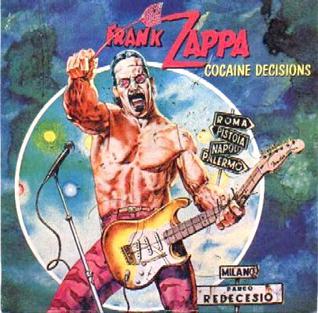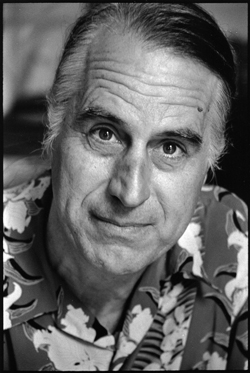
Frank Vincent Zappa was an American musician, composer, and bandleader. His work is characterized by nonconformity, free-form improvisation, sound experimentation, musical virtuosity and satire of American culture. In a career spanning more than 30 years, Zappa composed rock, pop, jazz, jazz fusion, orchestral and musique concrète works; he also produced almost all of the 60-plus albums that he released with his band the Mothers of Invention and as a solo artist. Zappa also directed feature-length films and music videos, and designed album covers. He is considered one of the most innovative and stylistically diverse musicians of his generation.

Theodor W. Adorno was a German philosopher, sociologist, psychologist, musicologist, and composer.

Joe's Garage is a three-part rock opera released by American musician Frank Zappa in September and November 1979. Originally released as two separate albums on Zappa Records, the project was later remastered and reissued as a triple album box set, Joe's Garage, Acts I, II & III, in 1987. The story is told by a character identified as the "Central Scrutinizer" narrating the story of Joe, an average adolescent male, from Canoga Park, Los Angeles, who forms a garage rock band, has unsatisfying relationships with women, gives all of his money to a government-assisted and insincere religion, explores sexual activities with appliances, and is imprisoned. After being released from prison into a dystopian society in which music itself has been criminalized, he lapses into insanity.

George M. Duke was an American keyboardist, composer, singer-songwriter and record producer. He worked with numerous artists as arranger, music director, writer and co-writer, record producer and as a professor of music. He first made a name for himself with the album The Jean-Luc Ponty Experience with the George Duke Trio. He was known primarily for 32 solo albums, of which A Brazilian Love Affair from 1979 was his most popular, as well as for his collaborations with other musicians, particularly Frank Zappa.

Fredric Jameson is an American literary critic, philosopher and Marxist political theorist. He is best known for his analysis of contemporary cultural trends, particularly his analysis of postmodernity and capitalism. Jameson's best-known books include Postmodernism, or, The Cultural Logic of Late Capitalism (1991) and The Political Unconscious (1981).
New musicology is a wide body of musicology since the 1980s with a focus upon the cultural study, aesthetics, criticism, and hermeneutics of music. It began in part a reaction against the traditional positivist musicology of the early 20th century and postwar era. Many of the procedures of new musicology are considered standard, although the name more often refers to the historical turn rather than to any single set of ideas or principles. Indeed, although it was notably influenced by feminism, gender studies, queer theory, postcolonial studies, and critical theory, new musicology has primarily been characterized by a wide-ranging eclecticism.

200 Motels is a 1971 surrealist musical film written and directed by Frank Zappa and Tony Palmer, and featuring music by Zappa. An international co-production of United States and the United Kingdom, the film stars the Mothers of Invention, Theodore Bikel, Keith Moon and Ringo Starr.
Raya Dunayevskaya, later Rae Spiegel, also known by the pseudonym Freddie Forest, was the American founder of the philosophy of Marxist humanism in the United States. At one time Leon Trotsky's secretary, she later split with him and ultimately founded the organization News and Letters Committees and was its leader until her death.

Waka/Jawaka is the fourth solo album, fifteenth album counting the work of his band the Mothers of Invention, by Frank Zappa, released in July 1972. The album is the jazz-influenced precursor to The Grand Wazoo, and as the front cover indicates, a sequel of sorts to 1969's Hot Rats. According to Zappa, the title "is something that showed up on a ouija board at one time."

Burnt Weeny Sandwich is the seventh album by the American rock band the Mothers of Invention, and the ninth overall by Frank Zappa, released in 1970. It consists of both studio recordings and live elements. In contrast to the next album Weasels Ripped My Flesh, which is predominantly live and song-oriented, most of Burnt Weeny Sandwich focuses on studio recordings and tightly arranged compositions.

The Mothers of Invention was an American rock band from California. Formed in 1964, their work is marked by the use of sonic experimentation, innovative album art, and elaborate live shows.

You Can't Do That on Stage Anymore, Vol. 3 is a double disc live album by Frank Zappa, spanning from December 10, 1971, to December 23, 1984. It was released in 1989.

Stadio Renzo Barbera is a football stadium in Palermo, Italy. It is currently the home stadium of Palermo F.C. team. The stadium was inaugurated during the fascist era on 24 January 1932, and was originally named Stadio Littorio after the Italian word for the fasces symbol. The opening match was Palermo vs Atalanta, with Palermo winning 5–1. A running track surrounded the pitch and there were no stands behind either goal. In 1936, the stadium was renamed Stadio Michele Marrone, in memory of a soldier killed during the Spanish Civil War. In 1945, the name was changed again at the end of World War II to Stadio La Favorita, taken from the name of the local ancient game preserve of Frederick II, Holy Roman Emperor in the 13th century.
"A Token of My Extreme", by Frank Zappa, is a song on the 1979 concept album Joe's Garage [Part II]. The main character from this triple-album rock-opera has his mind messed-up by Lucille then "finally does something smart" and "pays a lot of money to L. Ron Hoover and the First Church of Appliantology."
Sleep Dirt is an acoustic guitar duet featuring Frank Zappa and James Youman on Zappa's album Sleep Dirt.

"Find Her Finer" is a 1976 single by Frank Zappa from the album Zoot Allures. The song was recorded with Zappa's lips extremely close to the microphone, creating an intimate sound. Roy Estrada provided falsetto vocals to create a comic effect to the song. It was intended to be the lead single for Zoot Allures, but failed to chart, unlike its other single "Disco Boy". A live and sped up jazz version can also be found on the album The Best Band You Never Heard in Your Life. It was played in concert in 1976 and 1988.

"Cocaine Decisions" is a 1983 single by American musician Frank Zappa, from the album The Man from Utopia. A live version was on the album You Can't Do That on Stage Anymore, Vol. 3. It was played in concert from 1981 to 1984.
"A Little Green Rosetta", by Frank Zappa, is the final song on the 1979 concept album Joe's Garage Acts II & III. The main character from this triple-album rock opera is faced with the decline of the music industry, and is forced to work on an assembly line placing little frosted rosettes on top of muffins at the Utility Muffin Research Kitchen facility
"I Have Been in You", by Frank Zappa, is the opening song on the 1979 album Sheik Yerbouti. Taking the structure of a love song pastiche, Zappa used the composition to ridicule Peter Frampton's 1977 album and single I'm in You. Zappa's parody was directed at Frampton's change from the earnest musician to teen pop idol, replete with bare chested album cover, and syrupy love ballads. The song is in the same vein as the Mothers of Invention's lampooning of the Beatles with We're Only in It for the Money.

Gerry Fialka is an American experimental filmmaker, curator, lecturer, interviewer, and writer. He lectures and leads workshops on experimental film, avant-garde music and art, subversive social media, books by James Joyce, and Marshall McLuhan’s media theory. He was Frank Zappa’s archivist and production assistant for ten years. LA Weekly has described Fialka as a “cultural revolutionary”.













